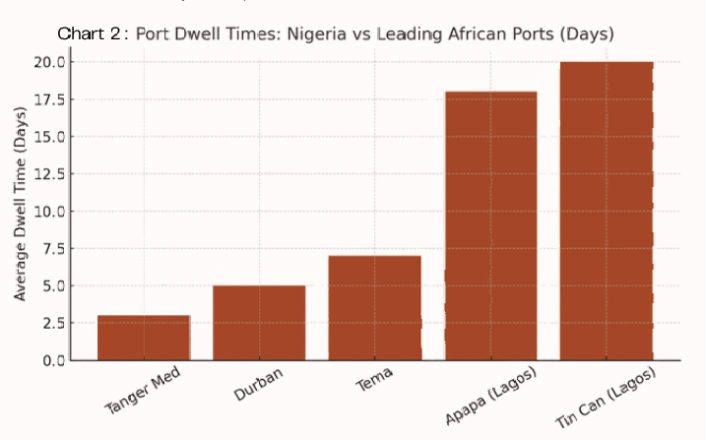The Bashir Adeniyi Centre for International Trade and Investment (BACITI) of the Nigerian Institute Of international Affairs (NIIA), called on the Nigerian Ports Authority (NPA) to accelerate full digitalization of the port community system (PCS) across all major ports in the country.
BACITI made the call in its just released May Economic Insight, noting that the competitiveness of Nigeria’s sea ports are still below that of Morocco, Kenya, Singapore and Rotterdam.
Said the report: “The World Bank recently ranked Lagos ports at 311 out of 370 ports globally in its Container Port Performance Index (CPPI).

By modernizing its ports, investing in infrastructure, embracing digital efficiency, and championing the tenets of AfCFTA, Nigeria can transform to a powerhouse of regional trade.
” Nigeria is West Africa’s trade gateway. According to the Nigerian Ports Authority (NPA, 2024), Nigerian ports handle over 80 percent of national trade volume. In 2023, Lagos ports alone processed 1.5 million TEUs (Twenty-foot Equivalent Units) — about 70% of Nigeria’s container trade.” Conversely, in digitalization and smart ports, Singapore and Rotterdam lead the way: over 95 percent of port transactions are fully digital.”
Equally, in Africa, Tanger Med (Morocco) has become a continental model, reducing dwell times from 12 days to 3 days through Port Community Systems (PCS) whereas, in Nigeria, long port dwell times further raise costs, undermining the competitiveness of African businesses.”
BACITI further noted that without the full digital upgrades, the full promise of AfCFTA remains out of reach.
It added : In a world of unpredictable shocks, Africa’s best defense is a strong, flexible continental trading system. Building resilient port and trade logistics in Africa will not happen overnight, but the trajectory is set.
Nigeria, with its immense economic weight, has a leading role to play in this journey.
By modernizing its ports, investing in infrastructure, embracing digital efficiency, and championing the tenets of AfCFTA, Nigeria can transform to a powerhouse of regional trade.
This transformation is already underway – seen in projects like the Lekki Deep Sea Port and initiatives to streamline port operations.
The ripple effects of a more efficient Nigeria will be felt across the continent: smoother supply chains, more robust intra-African commerce, and better insulation from global turbulence.”

